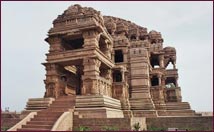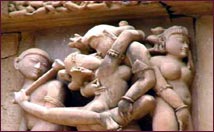 The
hub of tourist activity are the temples built by the Chandela
Rajputs, who can be traced as descendants of the moon god. The
head of the clan is believed to have been a valiant warrior who
fought lions bare-handed (hence the emblem, frequently seen at the
temples, of a warrior grappling with a lion); he is said to have
ordered the building of the temples as a means of salvation for his
mother, Hemvati, who was ravished by the Moon god. The spate of
temple- building which began about the middle of the 9th century and
continued until the early 12th century must have used the skills of
thousands of sculptors, architects and masons; unfortunately, there
is almost no record of this activity in the annals of Indian
history. By the time the last temple was completed the Chandela
dynasty had sunk into oblivion. Khajuraho was the Chandela capital
for only a brief period; they ruled for the most part from Kalinjar
and other parts of the Bundelkhand region, with Khajuraho remaining
their religious center.
The
hub of tourist activity are the temples built by the Chandela
Rajputs, who can be traced as descendants of the moon god. The
head of the clan is believed to have been a valiant warrior who
fought lions bare-handed (hence the emblem, frequently seen at the
temples, of a warrior grappling with a lion); he is said to have
ordered the building of the temples as a means of salvation for his
mother, Hemvati, who was ravished by the Moon god. The spate of
temple- building which began about the middle of the 9th century and
continued until the early 12th century must have used the skills of
thousands of sculptors, architects and masons; unfortunately, there
is almost no record of this activity in the annals of Indian
history. By the time the last temple was completed the Chandela
dynasty had sunk into oblivion. Khajuraho was the Chandela capital
for only a brief period; they ruled for the most part from Kalinjar
and other parts of the Bundelkhand region, with Khajuraho remaining
their religious center. The most important aspect of the temples is the abundance of sculptures that decorate the facades and interiors of the shrines. In this profusion of images attention has understandably been paid to divinities, less Understandably to celestial beauties and the female form in general and controversially, to graphic sexual representations. Over the years a number of explanations have been forthcoming for the presence of erotic sculptures at what was essentially a religious centre; no single theory, however, has been able to justify their profuse expression. Were these temple centres of tantrik mysticism, which cites sex as an important component of human development towards the Absolute or were they merely a reactionary swing away from the austerities preached by the Buddha? Perhaps the answer can be found as excavations in the region continue, but this much is certain: Buddhism did at one time have a strong presence here, just as tantric rituals enjoyed a wide adulation during the medieval period.
 As
Chandela power diminished, the importance of their sometime-capital
also waned. Its heavily forested terrain could not provide much
revenue, and served to deter invading Muslim armies (for whom the
temples were of little interest, while the sculptures could only
have appeared offensivethey certainly did to T. S. Burt, the British
engineer who is credited with their 'discovery' in the mid-19th
century). The temples were never, so to say, lost', for villagers
and tribal inhabitants of the region were familiar with them; they
continued to use one temple in particular Matangeshwar Mahadev for
worship, especially on the occasion of Shivratri. While early
travelers such as Alberuni and lbn Batuta had reported the presence
of the temples, they were not dwelt upon in depth, possibly because
of there being abandoned and overgrown by bushes and weeds. Burt
announced their presence to the world, and the first major data on
them was collected by General Alexander Cunningham in his Survey of
India reports. temples, but their inaccessibility made their study
and regular travel to the site impossible. Over the years, roads
were laid and the minimal facilities provided; then, a couple of
decades ago, the first luxury hotel project revived interest in the
region, and the resurrection of Khajuraho began.
As
Chandela power diminished, the importance of their sometime-capital
also waned. Its heavily forested terrain could not provide much
revenue, and served to deter invading Muslim armies (for whom the
temples were of little interest, while the sculptures could only
have appeared offensivethey certainly did to T. S. Burt, the British
engineer who is credited with their 'discovery' in the mid-19th
century). The temples were never, so to say, lost', for villagers
and tribal inhabitants of the region were familiar with them; they
continued to use one temple in particular Matangeshwar Mahadev for
worship, especially on the occasion of Shivratri. While early
travelers such as Alberuni and lbn Batuta had reported the presence
of the temples, they were not dwelt upon in depth, possibly because
of there being abandoned and overgrown by bushes and weeds. Burt
announced their presence to the world, and the first major data on
them was collected by General Alexander Cunningham in his Survey of
India reports. temples, but their inaccessibility made their study
and regular travel to the site impossible. Over the years, roads
were laid and the minimal facilities provided; then, a couple of
decades ago, the first luxury hotel project revived interest in the
region, and the resurrection of Khajuraho began.Declared a World Heritage Site in 1968 in order to preserve its splendour for posterity , Khajuraho is a prominent , must see destination. The temples of Khajuraho are India's unique gift to the world, representing an ode to life and love and joy and are perfect in execution and sublime in expression . Life in every form and mood , has been captured in stone , testifying not only to the crafts man's artistry but also to the extraordinary breadth of vision of Chandela Rajputs under whose rule the temples were conceived and constructed.





